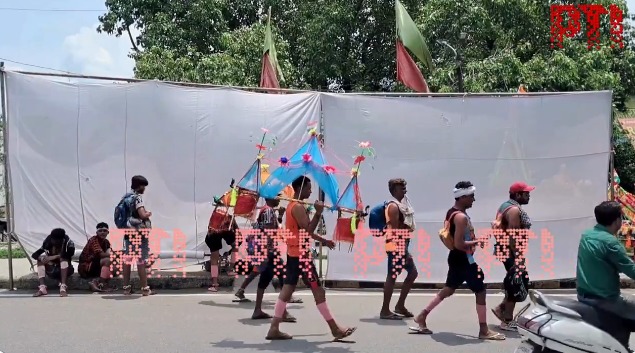“It’s all part of a larger project of invisibilisation of Muslims,” said Ziya Us Salam, an eminent journalist and author of a widely acclaimed book, Being Muslim in Hindu India, to Radiance.
27 Jul. 24: A sort of controversy has emerged in Haridwar after mosques and mazars along the Kanwar Yatra route were covered by local authorities. This move, palpably intended to ‘ensure a smooth passage for the Kanwar Yatra pilgrims’, was met with swift backlash, particularly from the Congress party, which accused the BJP of undermining religious harmony and inclusivity, said an ABP news report.
“It’s all part of a larger project of invisibilisation of Muslims,” said Ziya Us Salam, an eminent journalist and author of a widely acclaimed book, Being Muslim in Hindu India, to Radiance.
“First they prohibited Muslims from praying on public spaces. Next they stopped giving permission for building new mosques. Then they started demolitions in the name of road widening, etc. They banned the azaan too. Finally, they would want mosques not to have any distinct features and look like apartments or community halls.
“You don’t see Muslim architecture, their places of worship, their hijab, their food. And invisibilisation is complete!
“Of course, Muslim contribution is erased from history books, too.”
The coverings were placed on several mosques and mazars along the yatra’s route, ostensibly to prevent any potential conflicts or disruptions. However, this action quickly drew criticism for being insensitive to the sentiments of the Muslim community. The Congress party was at the forefront of the condemnation, with leaders calling it a blatant disregard for religious tolerance and a tactic to marginalize minority communities.
“The covering of religious sites is an affront to our values of secularism and unity,” said a Congress spokesperson. “This action by the BJP-led administration is not just unnecessary but deeply offensive to the Muslim community. It sends a message that their presence and their places of worship are unwelcome.”
In response to the growing criticism, local authorities reversed the decision, removing the coverings from the mosques and mazars. The reversal aimed to quell the growing discontent and restore a sense of communal harmony in the city.
BJP leaders defended the initial decision, stating that it was taken purely for ‘security reasons’ and to ‘avoid any untoward incidents’ during the yatra, which sees a massive influx of pilgrims. “Our intention was never to disrespect any religion,” a BJP representative explained. “The safety and smooth conduct of the Kanwar Yatra were our primary concerns.”
The Kanwar Yatra, an annual pilgrimage dedicated to Lord Shiva, sees millions of devotees, known as Kanwariyas, walking long distances to collect sacred water from the Ganges River. The yatra is marked by heightened security and logistical arrangements, given the sheer number of participants.
Despite the reversal of the coverings, the incident has sparked a broader discussion about the handling of religious sensitivities in India. Critics argue that actions like these exacerbate communal tensions and alienate minority communities, rather than fostering an environment of mutual respect and understanding.
The Congress party has demanded a formal apology from the BJP and assurances that such actions will not be repeated in the future. “We must strive to protect the religious rights of all communities,” said a senior Congress leader. “Actions that single out any community are detrimental to the fabric of our nation.”
As the dust settles, the incident remains a reminder of the delicate balance required in managing India’s diverse religious landscape, especially during major religious events.




